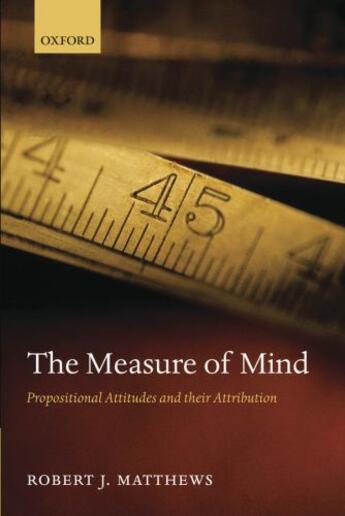Des idées de lecture pour ce début d'année !
Passionné(e) de lecture ? Inscrivez-vous
gratuitement ou connectez-vous pour rejoindre la
communauté et bénéficier de toutes les fonctionnalités du site !

The Measure of Mind provides a sustained critique of a widely held representationalist view of propositional attitudes and their role in the production of thought and behaviour. On this view, having a propositional attitude is a matter of having an explicit representation that plays a particular causal/computational role in the production of thought and behaviour. Robert J. Matthews argues that this view does not enjoy the theoretical or the empirical support that proponents claim for it; moreover, it misconstrues the role of propositional attitude attributions in cognitive scientific theorizing. He then goes on to develop an alternative measurement-theoretic account of propositional attitudes and the sentences by which we attribute them. On this account, the sentences by which we attribute propositional attitudes function semantically like the sentences by which we attribute a quantity of some physical magnitude (e.g., having a mass of 80 kilos). That is, in much the same way that we specify a quantity of some physical magnitude by means of its numerical representative on a measurement scale, we specify propositional attitudes by means of their representatives in a linguistically-defined measurement space.
Matthews argues that, unlike the representationalist view, his account of propositional attitudes draws a clear distinction between propositional attitudes and our natural language representations of them, and does not presume that salient properties of the latter can simply be read back onto the former. On his view, propositional attitudes turn out to be causally efficacious aptitudes for thought and behaviour, and not mental entities of some sort. In defending this approach, Matthews provides a plausible account both of the standard philosophical puzzles about propositional attitudes, and of the role of propositional attitude attributions in cognitive scientific theorizing.
Il n'y a pas encore de discussion sur ce livre
Soyez le premier à en lancer une !

Des idées de lecture pour ce début d'année !

Si certaines sont impressionnantes et effrayantes, d'autres sont drôles et rassurantes !

A gagner : la BD jeunesse adaptée du classique de Mary Shelley !

Caraïbes, 1492. "Ce sont ceux qui ont posé le pied sur ces terres qui ont amené la barbarie, la torture, la cruauté, la destruction des lieux, la mort..."